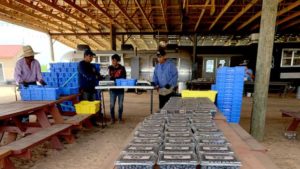When Florida Grower® magazine’s State of the Vegetable and Small Fruit Industry Survey was sent to readers for input, the coronavirus outbreak was in its earliest days. As growers responded to the survey, more normal considerations were top of mind. Even then, more than half of respondents believed the virus would directly impact their crop markets.
As we evaluated results of this year’s survey, we’ve had to supplement the information with emerging realities of COVID-19 and its impact on Florida agriculture. While some specialty crop segments experienced increased demand as the pandemic spread, markets soon collapsed, especially those dependent on food service. With restaurants, schools, hotels, and cruise lines partially or entirely shut down, demand dried up. Florida’s tomato industry was hit particularly hard.
“While we’re doing our best to divert supplies to the grocery segment, it will not be nearly enough to offset the losses from the reduced business in food service,” says Michael Schadler, Executive Vice President of the Florida Tomato Exchange. “Needless to say, this is a disaster for most of our growers as we’re fully planted for the spring crop, which was just beginning to be harvested.”
Gene McAvoy, UF/IFAS Vegetable Extension Agent Emeritus, began collecting intelligence from local growers in early April to prepare testimony to deliver to all of UF/IFAS and officials with the Florida Department of Agriculture and Consumer Services (FDACS).
A local produce broker informed McAvoy that by March 24 the impacts of COVID-19 were becoming evident in sales. He noted that tomato sales had plummeted by 85% and the demand for green beans and cabbage had dropped by half.
South Florida grower R.C. Hatton plowed 100 acres of green beans (or about 2 million pounds) and 60 acres of cabbage (or 5 million pounds). Tony DiMare, Vice President of DiMare Fresh, estimated that by season’s end, about 10 million pounds of the company’s tomato crop will go unharvested.
Many farmers in the Immokalee area were forced to empty coolers as perishable products found no buyers. Just one farm had reported the need to dump more than 100,000 pounds of product by the first week of April.

Photo courtesy of KeyPlex
Trying to Adapt
According to McAvoy’s report, with normal markets drying up, some farms are trying new ways to move product. Sam S. Accursio and Sons Farms’ packinghouse in Homestead opened its doors to direct sales. The family sold produce boxes for $10. Over two weekends, 120,000 pounds of produce (squash, tomatoes, beans, and cucumbers) were sold. In addition, they partnered with a blueberry grower, H&A Farms in Mt. Dora, to move 20,000 flats of berries sold at 12 pints for $20.
Similar efforts to go direct to consumers were being made by growers across the state. Agricultural input suppliers KeyPlex and Magna-Bon teamed up in a grassroots effort with H&A Farms to connect the farm with consumers in the Orlando area via the Next Door app, NextDoor.com. The first delivery moved 200 pounds of product.
The Florida Fruit and Vegetable Association (FFVA) spearheaded an effort to identify growers who are now selling direct to consumers via a Direct to Consumer website. FDACS has created a similar list called “Florida Farm to You.”
Agriculture Nikki Fried has been in contact with a number of large retailers, including Publix, Walmart, and Whole Foods, as well as state agencies and the USDA, requesting that they purchase or stock more Florida-grown commodities. Sprouts Farmers Markets recently indicated they would increase efforts to stock more Fresh From Florida and Florida-grown products.
Beyond their normal giving, many farms are donating produce that can’t find a market to various food banks across the state. In one week alone, growers from the Immokalee area donated more than 3 million pounds of produce to the Harry Chapin Food Bank. During a two-week period, Wish Farms donated 220,000 pounds of strawberries, or the equivalent of nine semitrailer loads. Growers interested in making donations should contact FDACS at Melanie.Mason@FDACS.gov.
Demand American Grown
As the COVID-19 pandemic unfolded, the general public suddenly became interested in where and how their food is grown. National media began reporting the impact the crisis was having on farms across Florida and the U.S. It became a rallying call from growers for consumers to demand American grown, popularized by the hashtag #DemandAmericanGrown. Florida blueberry growers particularly took on the challenge.
While blueberry sales started strong amid the outbreak, the market fell off as the crisis unfolded. According to Bill Braswell, a blueberry grower from Winter Haven, from March 1 through April 2, the state’s growers had produced 6.1 million pounds of blueberries. In that same period; Mexico had imported 17.4 million pounds into the U.S. according to the USDA. He and other growers said this is unacceptable anytime, but especially amidst the COVID-19 pandemic.
Regardless of how the pandemic plays out, COVID-19 has changed the world. It should also serve to emphasize the critical job farmers — who make up less than 2% of the population — serve in feeding and clothing the nation. It is not bumper sticker talk anymore. COVID-19 proved it is a fact.

